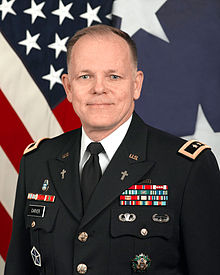Former Army Chief of Chaplains: Christians in the Crosshairs
 Former US Army Chief of Chaplains (MajGen) Doug Carver expressed grave concerns about the US military’s new transgender policy, questioning the DoD’s decision to implement the policy without regard to stakeholders like chaplain endorsers:
Former US Army Chief of Chaplains (MajGen) Doug Carver expressed grave concerns about the US military’s new transgender policy, questioning the DoD’s decision to implement the policy without regard to stakeholders like chaplain endorsers:
Military chaplains endorsed by the North American Mission Board, along with other Christian chaplains, appear to be “in the crosshairs of this new policy,” NAMB executive director of chaplaincy Douglas Carver told Baptist Press, noting religious liberty concerns.
Coming from a (recently) retired senior Army officer, that’s not an insignificant statement. It is fair to say there are likely many still in the military who have similar concerns, both within the chaplaincy and within the rank and file.
Carver wasn’t the only former military official and Southern Baptist to criticize the policy change:
Southeastern Baptist Theological Seminary professor Daniel Heimbach, former deputy assistant secretary of the Navy for manpower, told BP the Pentagon’s decision is “disastrous but comes as no surprise.”
“It is just the most recent step taken in our nation’s rapid descent into a state of social deconstruction and national weakness.”
“Our political leaders have lost their moral bearings…”
Mark Coppenger, a Southern Baptist Theological Seminary professor and retired Army officer, said lifting the ban imperils “decency” and “military readiness.”
A pastor local to Fort Hood said military members of his congregation are concerned for their ability to simply state their faith. Ashley Payne, pastor of Skyline Baptist Church in Killeen, Texas, and a former Army chaplain, said:
Some Christian military members have expressed concern that “If I’m asked … about my belief systems while I’m in the uniform and I tell them, ‘My belief systems do not believe [transgenderism] is a moral lifestyle,’ I could be brought up on accusations of being bigoted.”
That is not an unfounded concern. As discussed a few days ago, the official policy change details the lack of tolerance of “prohibited bias,” and US Navy Chaplain Wes Modder was almost railroaded out of the military for doing nothing more than answering direct questions on his theological position.
And these respected former Army officers — one who led the entire US Army chaplaincy corps as recently as 2011 — are concerned the magnitude and direction of the military’s social policy will soon clash with military religious freedom.
Given their expertise and recent history, they’re probably right.
ADVERTISEMENT
They probably are right, but I don’t remember either of them speaking out about similar social issues (or demonstrating public concern for same) while in their previous roles. Should they have?